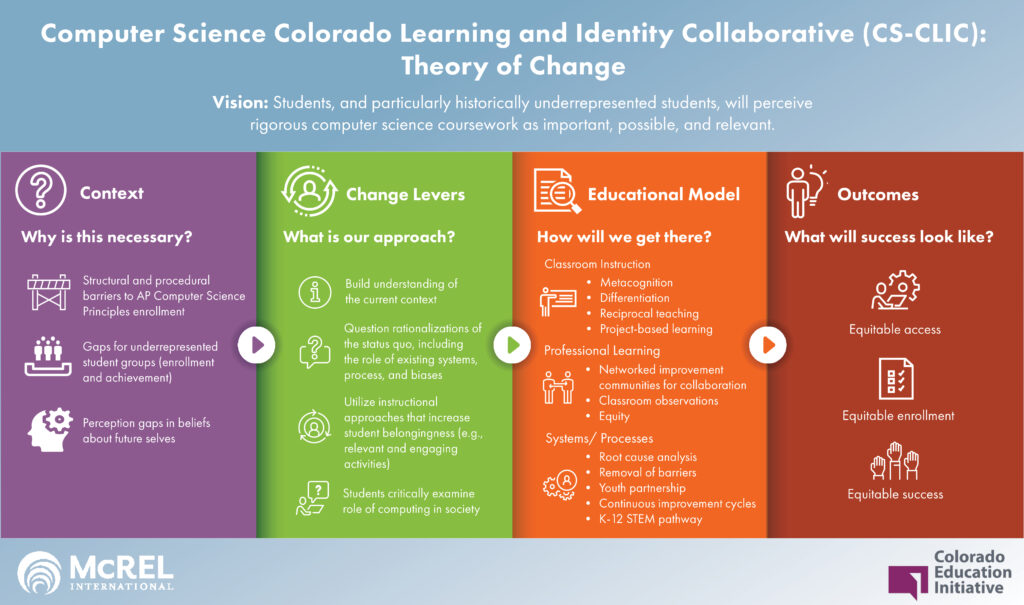After joining a professional development project led by McREL International and the Colorado Education Initiative (CEI), a handful of rural high school teachers are showing the direction to build equitable participation and achievement in demanding courses.
That’s a big task for a small group, but on the theory that a journey of a thousand miles begins with a single step, they banded together in the 2018–19 school year for the Computer Science Colorado Learning and Identity Collaborative (CS-CLIC). McREL and CEI, a nonprofit that cultivates systems improvement and equity in K–12 education, facilitated as the teachers explored ways to amplify their influence by working together.
All seven of them teach AP Computer Science Principles (APCSP). It’s one of the most demanding classes an American high school student can take, but it’s also one of the most unequal in terms of participation and achievement among minority and low-income students, which bodes poorly for the technology industry’s chances of diversifying its workforce. And for rural teachers, APCSP can be an isolating experience—the nearest colleague teaching the same course might be hundreds of miles away. Clearly, before the group could dig deeply into the inequity issue, they’d have to pick the most effective collaborative tools for the task.
McREL and CEI recommended a model called the Networked Improvement Community (NIC), which is characterized by rapidly advancing through a cycle called Plan-Do-Study-Act, or PDSA. Beginning with a broad problem of practice—that students, particularly historically underrepresented students, do not perceive rigorous computer science coursework as important, possible, or relevant—the group set out to explore the most promising ways to work together in a series of face-to-face and online forums. They would examine not only the qualities of a successful student, but those of a successful teacher. They later developed this Theory of Action:
CS-CLIC was initially designed as a three-year project to dig into these questions and use the answers to develop a PD program to help future teachers acquire the knowledge and teaching skills required to master challenging content and welcome a more diverse population of students in their classes. Sadly, the project was shortened to a single school year due to funding changes, but in that year the group did manage to establish an important finding: a healthy bump in a measure of students’ attitudes toward undertaking difficult work.
The measure, called Productive Interpretation of Difficulty—Importance, developed by George Smith and Daphna Oyserman in 2015, poses a series of statements designed to gauge how determined students are to push through challenging material, such as, “Struggling to complete a computer science task reminds me that the task is important.” Paired t-tests were used to compare differences in baseline and end-of-year scores. Among the 32 students who took both tests, the average score at the beginning of the year on this scale was 22.91 (out of a possible 36 points). The average score at the end of the year was 25.13. This significant increase indicates that over the course of the school year, students felt more strongly that difficult tasks were important to complete. This finding is directly tied to a piece of the vision of this work: Students will perceive rigorous computer science coursework as important.
What led to the improvement—and what can it tell us about the effectiveness of the NIC format? The teachers held thoughtful, reflective meetings about student engagement, student self-directed learning, relevance and real-world connections, student problem-solving skills, and enrollment barriers. Two tactics related to self-directed learning may have been particularly effective:
- Two teachers developed a presentation about self-directed learning as part of their PDSA and shared it with the rest of the NIC. It took students through the process of breaking down large tasks into smaller tasks, thinking through steps to take when they don’t know what to do, and how to decide that a task or project is done the best it can be done. These guiding questions may have impacted how students approach difficult tasks.
- And, students were presented with a computer science lesson to prepare and teach to their classmates. The preparation that students did for their lessons may have helped them realize that the content is difficult but important.
Teachers praised these and other opportunities to collaborate—opportunities they would not have had otherwise. “I’m the only person teaching computer science in my district, and I also teach elementary level, so having teachers teaching the same thing and having those peers is beyond worth to me,” said one. “Having a group to network with and discuss strategies for overcoming identity-related barriers was an amazingly powerful tool as a teacher, and the additional support provided by the CS-CLIC group was extremely valuable,” said another.
If more teachers nationwide embrace these collaborative techniques, years from now we may be able to look back on CS-CLIC as the beginning of the end of an educational inequity.
Susan Shebby, Ed.M., a managing evaluator at McREL, leads various research and evaluation projects, working with educators and education stakeholders to make formative improvements to project activities and determine whether summative outcomes have been achieved. Prior to joining McREL International in 2008, Ms. Shebby served as a teacher in public, private, and non-governmental schools in California, Paraguay, Mexico, Mongolia, and Thailand.
Brittney R. Fraumeni, a research associate at McREL, conducts qualitative and quantitative data collection, statistical analyses, literature reviews, and report development for K–12 schools and systems, higher education, and educational technology developers. Prior to joining McREL, she worked for the University of Chicago, helping develop a formative math assessment for preschool students and facilitating professional development sessions for teachers.

